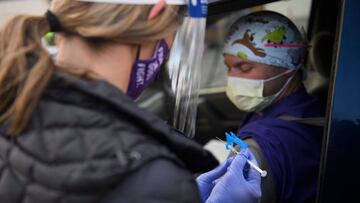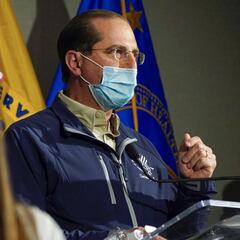What covid-19 vaccine reactions have appeared & what percentage of people suffered them?
Mass vaccination programs are now well under way in the US and UK. So far four isolated reactions have been reported. What happened and what's the risk?

Two reactions to Pfizer vaccine in Alaska: both fully recovered
Two healthcare workers in the same hospital Alaska experienced reactions to the vaccine this week, both just minutes after receiving Pfizer’s vaccine which was approved days ago for emergency use by the FDA.
One worker, who had no previous history of allergies experienced a rash over her face and torso, shortness of breath and an elevated heart rate. It was assessed and treated as a severe allergic reaction and the patient stayed in hospital overnight for observation on Wednesday. A second worker developed eye puffiness, light-headedness and a scratchy throat 10 minutes after the injection, the hospital said in a statement.
He was taken to the emergency room and treated with epinephrine, Pepcid and Benadryl, although the hospital said the reaction was not considered anaphylaxis. The worker was back to normal within an hour and released.
The hospital, which had administered 144 total doses as of Wednesday night, said both workers did not want their experiences to have a negative impact on others lining up for the vaccine.
Speaking to the New York Times, Dr. Paul A. Offit, a top vaccine expert, said the appropriate precautions were already in place. For instance, he said, the requirement that recipients remain with the nurse for 15 minutes after getting the vaccine helped ensure the woman in Alaska was quickly treated.
Pfizer and the FDA are revising information for use and monitoring of the Covid-19 vaccine after rare allergic reactions were seen in some recipients https://t.co/G3tv0plKuV via @business
— Kevin Whitelaw (@KevinWhitelaw1) December 17, 2020
Two allergic reactions recorded in the UK: both fully recovered
On Tuesday 8 December, as the United Kingdom administered its first doses of the newly-approved vaccine, two reactions were widely reported. The news swiftly prompted new advice that anyone who has previously suffered a significant allergic reaction to vaccines, medication or food should not have the Pfizer/BioNTech covid inoculation.
The two people affected were National Health Service (NHS) workers with existing severe allergies – both carry with them adrenaline pens – and both had a reaction shortly after having the coronavirus vaccine, received treatment and had fully recovered by the next day.
Speaking to the BBC, Professor Stephen Powis, medical director for the NHS in England, said this was "common with new vaccines."
Several thousand people were vaccinated on the same day in hospital clinics on the first day of the UK rollout of the new coronavirus vaccine.
What percentage of recipients have had a reaction to covid-19 vaccine?
These four reactions are so far isolated cases and all four patients fully recovered very quickly. On occasion, reactions such as these can be seen with the regular flu shot too.
When balanced against the fact that more than 300,000 Americans have died and 16.5 million have been infected with covid-19 since January 2020, and cases continue to surge as winter drives people indoors, the Pfizer vaccine is light at the end of the tunnel, having proven to be extremely effective in large-scale medical trials.
According to Our World in Data, excluding the US for which no data is available, so far at least 287,897 doses have been administered.
Since the vaccination was rolled out in the UK last week, there have been two reported allergic reactions out of approximately 140,000 doses administered. This works out at 0.0014% of patients.
So far in the US, there is no data on the doses administered since vaccinations began on Wednesday.
Given the scrutiny over each and every negative side effect as this extraordinary process continues, we can be sure that there will be reports as soon as any other reactions were arise, as the mass vaccination programs march on.
For the time being in the US, the only people who will be receiving the vaccine are healthcare workers – all 21 million of them – and the three million elderly Americans who live in long-tern care homes. The under 65’s who are healthy may be able to get their vaccinations as early as April, said Dr Anthony Fauci, who heads the National Institutes of Allergy and Infectious Diseases.
Related stories
The Pfizer vaccine was shown to be safe and about 95% effective in a clinical trial involving 44,000 participants.
On Tuesday, the FDA reported that Moderna, a US company seeking approval for its vaccine, produced a drug that is 94% effective in warding off the virus. The rollout of Moderna's offering could begin early next week.


